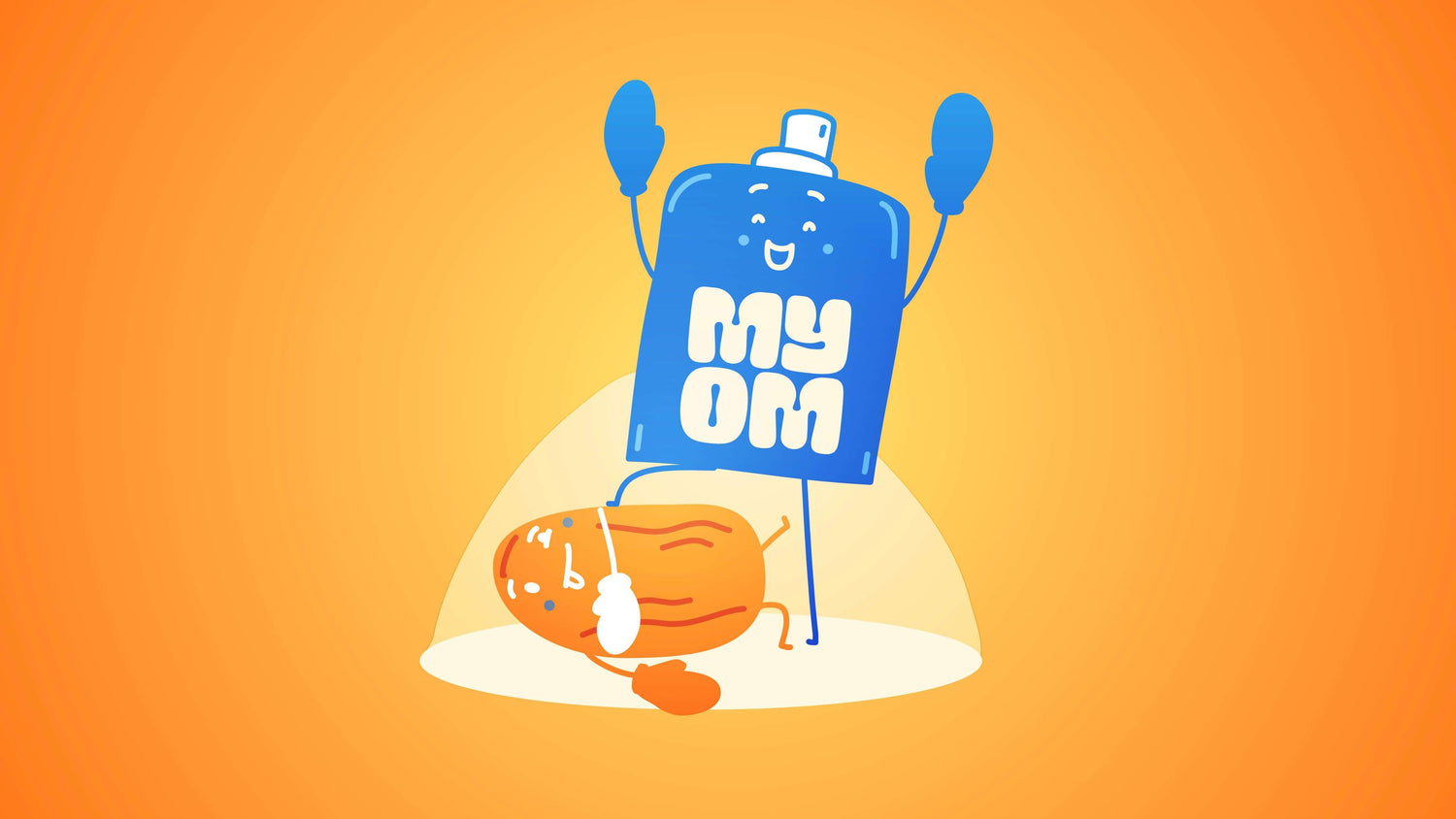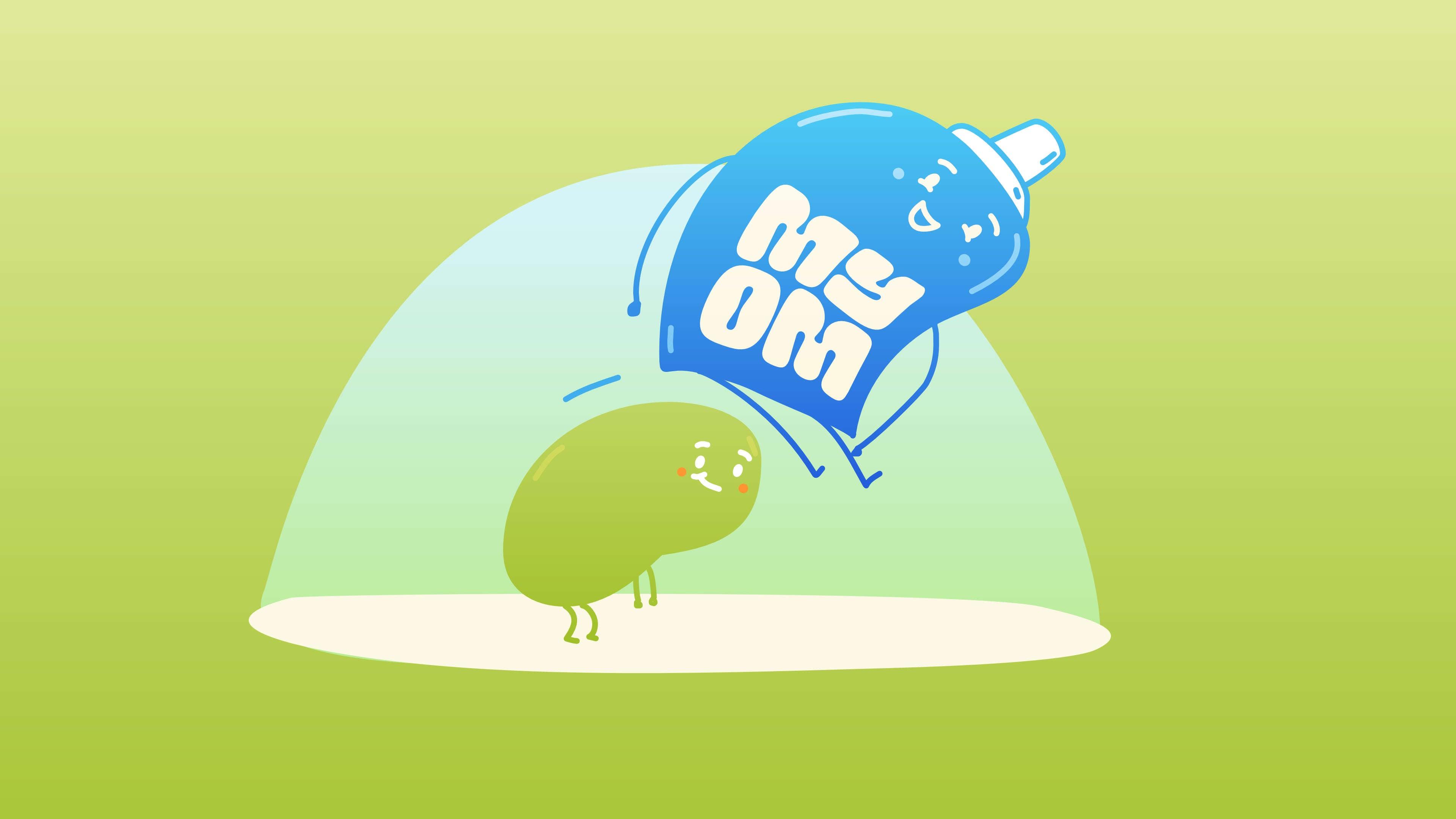Comparing Oat Milk and Almond Milk
Oat milk and almond milk have emerged as popular plant-based alternatives to dairy milk. When comparing oat milk vs almond milk, there are several nutritional and sustainability differences worth considering. This article explores the contrasts between these two dairy-free options, as well as examines the latest milk innovation, MYOM Original Oat milk premix.
Comparative Analysis:
- Calcium: Most commercial brands of oat milk and almond milk are fortified with calcium making them great options for bone health.
- Iron and Phosphorus: Oat milk is a better source of iron and phosphorus, beneficial for energy levels and bone health.
- Vitamins: In general, fortified oat milk has more vitamin B12 and D3, although both milks contain vitamins and minerals. Almond milk may have slightly more riboflavin.
- MYOM fortifies its oat milk premix with calcium, Vitamin D, B12, and iodine. MYOM is a natural choice that never uses dipotassium phosphate, additives, or stabilisers.
Nutritional Differences between Oat Milk and Almond Milk
Oat milk tends to be higher in calories and carbohydrates compared to almond milk. 100ml oat milk contains 48 calories and 6.5g of carbohydrates, whereas almond milk has around 17 calories and 1g of carbohydrates in 100ml. Almond milk provides 1.5g of fat per 100ml, oat milk generally has 2g of fat of which 0.4g is saturated. 100ml of MYOM Original Oat milk has 40 calories and 5.5g carbohydrates.
100ml of fortified oat milk and almond milk provide around 15% of the daily recommended calcium intake. Oat milk edges out almond milk with 1.5 grams of protein per 100ml versus 0.6 grams.
Oat milk, with its greater amounts of carbohydrates and protein, offers a more satiating experience and a richer, creamier texture. Its additional fibre and vitamins enhance its nutritional benefits.
And where does MYOM come in, nutritionally? As a source of calcium MYOM provides 130mg of calcium per 100ml, delivering 16% of the recommended daily calcium intake. Vitamin D in MYOM further aids calcium absorption and bone health. Free of added sugars, MYOM contains only 2.3g of naturally occurring sugar per 100ml, less than most oat milk brands and even less than semi-skimmed dairy milk. Importantly, MYOM is fortified with the often-overlooked mineral iodine, providing 30μg per 100ml, equivalent to the amount in dairy milk. As iodine supports proper thyroid function and cognitive development, fortification makes MYOM a truly nutritious plant-based option. With its robust nutrient profile free of added sugars, MYOM oat milk promotes health as part of a plant-forward diet.
Protein Content Comparison
For oat milk, including MYOM, you will be looking at .4 grams of protein, compared to the 1 gram of protein provided by almond milk.
While the differences in protein content between oat milk, MYOM, and almond may seem small, for people looking to up their protein throughout the day, MYOM is a good option. Commercial oat and almond milk often have added protein or are fortified with other nutrients to compensate for any losses incurred during production.
Essential Amino Acids Found in Oat Milk and Almond Milk
Oat milk's essential amino acids include leucine, threonine, isoleucine, and lysine. Each of these plays a key role within the body, with leucine aiding muscle repair, and threonine supporting gut health and immune functions. Isoleucine is crucial for muscle metabolism as well as energy regulation, meaning a lack of isoleucine can contribute to feelings of lethargy and decreased appetite. Lysine, on the other hand, is important for protein synthesis and hormone production, both key components of a healthy body.
The essential amino acids that can be found in almond milk are phenylalanine, valine, and histidine. Phenylalanine is essential to produce neurotransmitters, valine is involved in muscle growth and energy production, and histidine is essential for the growth and repair of tissues.
Both oat milk and almond milk contribute to the overall amino acid profile in a diet, although their proportions and compositions may differ. Including almond milk and oat milk in your diet can help you maintain a healthy balanced lifestyle, especially for people who have adopted a plant-based diet or those with a lactose intolerance.

Fat Content Comparison
Oat milk and almond milk offer contrasting amounts of fat, influenced not only by their primary ingredients but also by brand formulations and manufacturing processes. But what exactly is the difference?
Total Fat Content in Oat milk vs. Almond milk
Oat milk: Generally, oat milk contains around 2g of fat per 100ml serving, of which 0.4g are saturated fats. This low-fat content is reflective of its grain-based origin (oats!). With just 1.7g of fat per 100ml, of which 0.2g are saturated fats, MYOM is considered low-fat, making it a natural choice for anyone looking at cutting their fat intake.
Almond milk: In contrast, almond milk contains 1.5g of fat per 100ml serving of which 0.2g is saturated. The fat in almond milk is like MYOM premix and both are generally lower than leading commercial brands of oat milk sold in cartons.
Fat content can be impacted by processing methods. For example, if oat milk is extensively strained, it can reduce its natural fat content, while less straining can retain more of the natural oils from oats. For almond milk, however, the intensity of the straining process after blending the almonds with water can lead to variations in fat content. If it is more thoroughly strained, this will result in lower fat content as more almond solids (and therefore fats) are removed. For MYOM, the fat content is derived from the oats and rapeseed oil, making it a low-fat milk, clocking in at 1.7g per 100ml, when the premix is combined with water, of which just 0.2g is saturated fat.
Vitamin & Mineral Profile Comparison
Along with fat, carbohydrate and protein content, another key aspect to look at when comparing oat milk and almond milk is their vitamin and mineral profiles. Both oat milk and almond milk are often fortified to enhance their nutritional value, yet they inherently possess distinct profiles. Let's dive in.
Vitamin & Mineral Profile Found in Oat milk vs. Almond milk.
Oat Milk Vitamin & Mineral Profile:
- Calcium: Fortified oat milk contains about 15% of the daily value (DV) for calcium per 100 ml serving.
- Sodium: It has a sodium content of 2% DV per serving.
- Iron: Oat milk offers about 6% DV of iron per 100 ml serving.
- Phosphorus: It is relatively high in phosphorus, with about 112 mg per 100 ml serving.
- Vitamin B12: Oat milk typically contains 0.5 µg of Vitamin B12 per 100 ml serving.
- Riboflavin (Vitamin B2): There’s approximately 0.2 mg of riboflavin per 100 ml serving.
Almond Milk Vitamin & Mineral Profile:
- Calcium: Fortified almond milk contains the same levels of calcium as oat milk, providing about 15% DV per 100ml serving.
- Sodium: It has less than 1% DV of sodium per serving.
- Iron: Almond milk contains about 2% DV of iron per serving.
- Phosphorus: It contains around 30mg of phosphorus per 100 ml serving, which is significantly lower than oat milk.
- Vitamin B12: There is about 0.3 µg of Vitamin B12 per 100 ml serving in almond milk.
- Riboflavin (Vitamin B2): Almond milk contains about 0.3 mg of riboflavin per 100 ml serving.
MYOM Original Oat Vitamin & Mineral Profile:
- Calcium: MYOM Oat milk contains 130g of calcium - 16% of the daily value (DV) for calcium per 100 ml serving.
- Sodium: It has a sodium content of 10mg per 100 ml - 0.5% DV per serving.
- Iodine: MYOM offers about 20% DV of iodine per 100 ml serving - like dairy milk.
- Vitamin D3: It is relatively high at 0.75 µg per 100 ml serving - 16% of the daily value (DV).
- Vitamin B12: Oat milk typically contains 0.9 µg of Vitamin B12 per 100 ml serving, 36% DV per serving.
Sustainability Differences between Oat Milk and Almond Milk
As we move towards more sustainable living, many of us face conscious choices. The rise of plant-based milk has ushered in a new era where dietary considerations are not the only reasons propelling us towards dairy alternatives. So, we can make an informed decision, let us delve into the sustainability profiles of oat and almond milk.
Treading More Lightly: The Land Use Factor
It is important to consider the amount of land required to produce oat milk and almond milk. The statistics paint a vivid picture: producing 1 litre of oat milk requires 0.66m² of land, which sits comfortably alongside almond milk's modest 0.5m². However, when juxtaposed against the staggering 54m² needed for the same amount of dairy milk, the virtues of plant-based choice become much clearer.
Precious Drops: Water Consumption
Water requires conservation. Our food choices can truly have an impact on our blue planet. With oat milk utilising just 48.24 litres per litre, it's evident how oat milk can benefit our water-stressed world, especially when compared to almond milk's water-thirsty needs at 371.46 litres per litre. It’s worth reminding ourselves that dairy milk requires 628.2 litres of fresh water for every litre of milk we drink.
Air We Share: Carbon Footprint Considerations
Our actions often make their way into our atmosphere. When it comes to greenhouse gases, almond milk emits a relatively low 0.7kg CO2 per litre, marginally less than oat milk's 0.9kg. By comparison, dairy emissions are a hefty 3.15kg CO2 per litre. Choices become less about comparison and more about an individual responsibility to choose paths that release fewer shadows into the air we all share.
Nurturing Our Waters: Eutrophication and Nutrient Runoff
Beyond land, water, and air lies the subtle narrative of our water bodies that nourish life in profound ways. Both oat and almond milk are nearly side-by-side when it comes to eutrophication, that delicate balance of nutrients in our water systems, standing at 1.62g and 1.5g respectively. Again, dairy milk paints a different picture, contributing 10.65g of nutrient runoff, implicating a far-reaching impact on the water ecosystems and biodiversity.
Today, as health enthusiasts and advocates for a greener tomorrow, our choices carry a weight that extends beyond personal health into a profound responsibility and a rallying call for conscious action.
Why MYOM is the Clear Choice for Oat Milk Lovers
In summary, MYOM offers a unique solution that differs from traditional oat milk on the market. MYOM sets itself apart as a novel "premix" that allows consumers to make fresh oat milk at home on demand. This eliminates the financial and environmental costs associated with transporting heavy milk, which is mostly water anyway.
From factory to consumer dairy milk and plant-based milks follow similar packaging and distribution systems. MYOM provides a more sustainable alternative. By removing the water and enabling homemade oat milk whenever needed, MYOM shakes up the milk industry and establishes itself not as just another oat milk but as an innovative new product that empowers consumers, reduces waste, and promotes sustainability. When compared to traditional oat milk, MYOM’s unique prep-at-home format and flexibility make it a superior choice.
FAQs
What are the key nutritional benefits of oat milk compared to traditional dairy milk?
Oat milk offers a plant-based alternative rich in fibre and provides a good source of B vitamins. It's lower in fat and suitable for those with lactose intolerance or dairy allergies, making it a healthy choice for various dietary needs.
Can oat milk be a part of a weight management diet?
Yes, due to its moderate calorie count and lower fat content, oat milk can fit well into a weight management diet. It's also filling, thanks to its fibre content, which can aid in controlling hunger.
Are there any allergens in MYOM Shop's oat milk that consumers should be aware of?
While our oat milk is dairy-free and lactose-free, consumers with gluten sensitivity need to note that oats can sometimes contain gluten. Although there are no gluten-containing ingredients used (as oats are not a gluten-containing grain), due to the way oats are processed there is a risk of cross-contamination with gluten. We cannot guarantee or certify MYOM as gluten-free at the moment.
What makes MYOM Shop's oat milk a sustainable choice?
Here at MYOM, Our commitment to sustainability is important to us. Oat milk generally has a lower environmental impact, and we strive to maintain eco-friendly practices throughout our supply chain. We believe MYOM is a step in the right direction towards more sustainable choices without compromising taste and nutrition.
MYOM has an oat base and therefore retains all the well-documented sustainability advantages of oats over other plant-based milks and dairy. We don't add water at the factory, therefore removing 90% of the weight and volume of the onward distribution of carton-based alternatives. MYOM is ambient with a long shelf life, no chill-chain required, and only requires refrigeration once made. Our pouch packaging is recyclable in the soft plastics waste stream from home alongside similar packaging such as butter tubs. The bonded layers of cartons are more difficult to readily recycle with most cartons produced ending up in landfill.
MYOM’s smaller format means our customers make what they need when they need it, further reducing the amount poured away (estimated at 15% of all milk sold).
How can oat milk be incorporated into cooking and baking?
Our oat milk is versatile and can be used in a variety of recipes, from baking to cooking. Its creamy texture makes it great for sauces and baked goods, and it can be used as a dairy substitute in most recipes.
Is oat milk suitable for a vegan diet?
Absolutely! Our MYOM oat milk is completely plant-based, making it an ideal choice for vegans and those following a plant-based diet.
Learn More About MYOM
Now that you know how oat milk, and specifically MYOM’s oat milk premix, differs from almond milk, are you tempted to give it a go? Here are further resources with more information:
- Original Oat Drink | Best Tasting Vegan Oat Milk | MYOM - Are you set on giving MYOM a go? Buy your oat milk premix here.
- FAQs: Your Guide to Preparation, Nutrition & Sustainability (myom.shop) - It’s only natural that you have more questions. Luckily, we have the answers to anything you want to know, from nutrition to the sustainability of MYOM.
- Are Cows Bad for The Environment? [ A CLOSER LOOK MYOM - Do you want to dive deeper into the environmental aspect of milk? Let’s explore if cows really are bad for the environment.
Data sources:
- Dairy vs. plant-based milk: what are the environmental impacts? Published on Our World in Data by Hannah Ritchie January 19, 2022.
- Poore, J., & Nemecek, T. (2018). Reducing food’s environmental impacts through producers and consumers. Science, 360(6392), 987-992.
FAOstat: UN Food and Agriculture Organization (FAO) Statistics. Available at: http://www.fao.org/faostat/en/#data. - https://ourworldindata.org/faqs-environmental-impacts-food Published on Our World in Data by Hannah Ritchie 7 February 2022.





